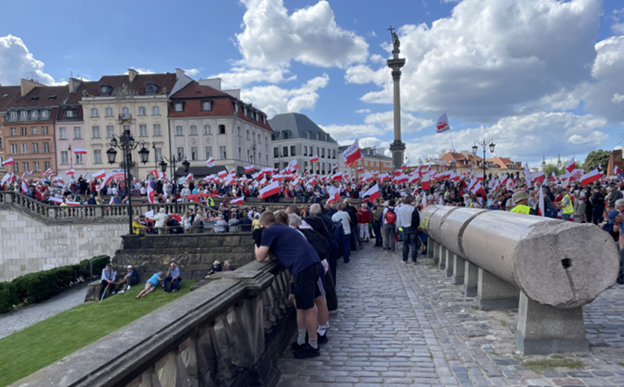Linguistic Immersion and Cultural Insight: Ryan Scharff’s Summer in Poland

By Ryan Scharff, Senior in Data Analytics and Slavic Studies (minor)
While never being my main area of study, language and linguistics have always been a secondary focus of mine and something I wish to pursue. After four semesters of Polish language classes at Ohio State, I decided that further exploration and study was of interest to me. My goal is to continue my language studies and combine it with my primary focus of data science to study the science of learning languages. Thanks to the Polish Studies Initiative scholarship that I was awarded, I was able to continue these studies over the summer, learning language and culture in Warsaw, Poland.
During my time in Warsaw, I learned my Polish skills increased and I was able to immerse myself in the language, speaking almost exclusively in Polish while I was there. This is essential for language learning because immersion is by far the best way to improve. I learned a lot of new words, including slang and colloquial phrases. Most importantly, I had lots of opportunities to practice speaking. I spoke for hours each day with my teacher, but also outside of class with others around the city. I spoke in Polish with my roommate, and we still chat even now that the program is over.
Life in Warsaw was an opportunity to learn about Polish and Slavic culture. The school I attended also had courses in Ukrainian and Belarusian, so I was able to speak and interact with many people from other countries, learning their stories and how they had arrived in Poland. The school hosted cultural learning opportunities, where we learned Polish traditions, made foods such as syrniki, or attended local festivals. There were also extra classes for other languages, where we learned small amounts of Belarusian and even Interslavic. I found this especially useful, as I learned some of the interesting cultural and linguistic differences between Polish and other Slavic languages.

I also had the opportunity to travel to other places in the region while in Europe, which gave greater insight into the relationships between countries of the region. For example, I went to Poprad, Slovakia, for one weekend and took in the similarities and differences between Slovakia and Poland. I was even able to speak Polish there without much of an issue, due to the languages being so similar. Visiting other Polish cities such as Kraków also let me see some of the nuances of Polish life.
As a result of my study abroad, I have deepened my understanding of not just the Polish language but also Polish and more generally Slavic culture. I will be forever grateful for the PSI scholarship award, as I likely would not have been able to have this kind of experience without it. I plan to continue studying Polish and hope to work in a language-related field in the future.
Interested in learning more about the Polish Studies Initiative (PSI)? Visit the PSI webpage and be sure to sign up for our CSEEES the Day newsletter to find out when applications for 2026 PSI scholarships and grants will open.
